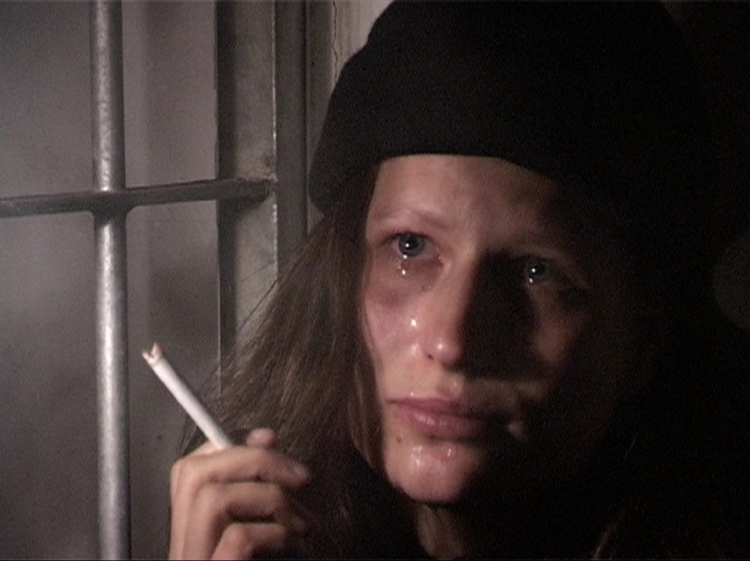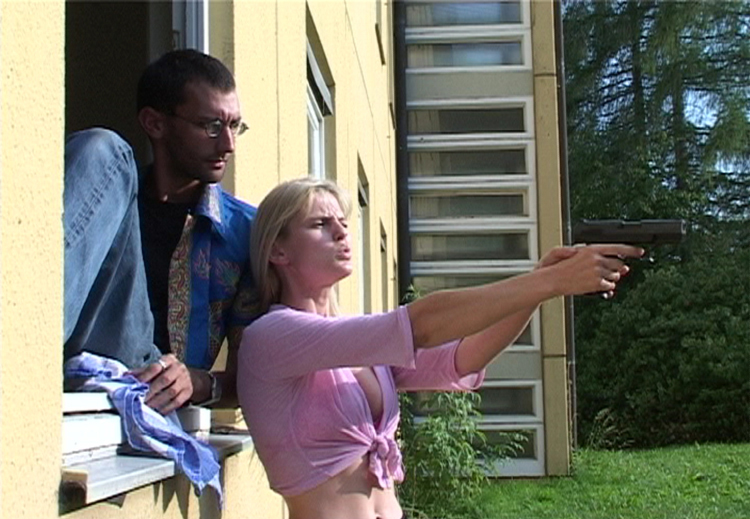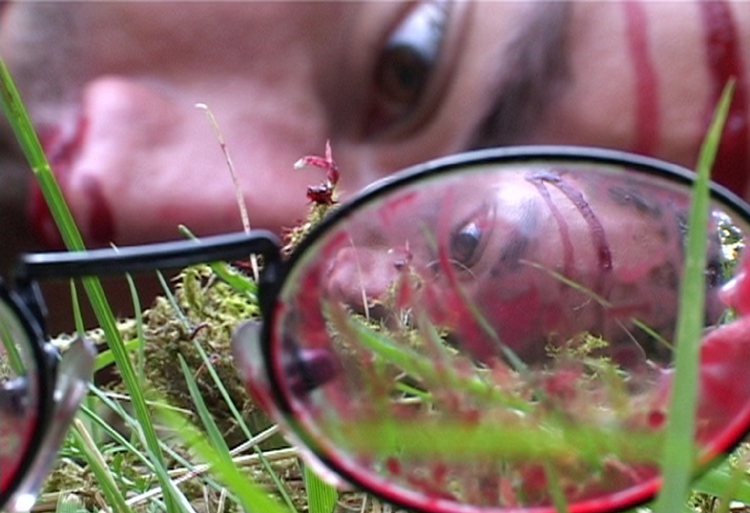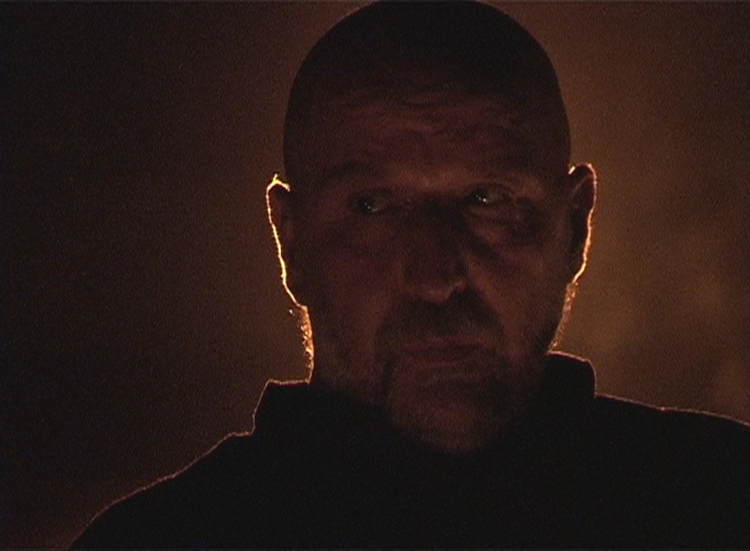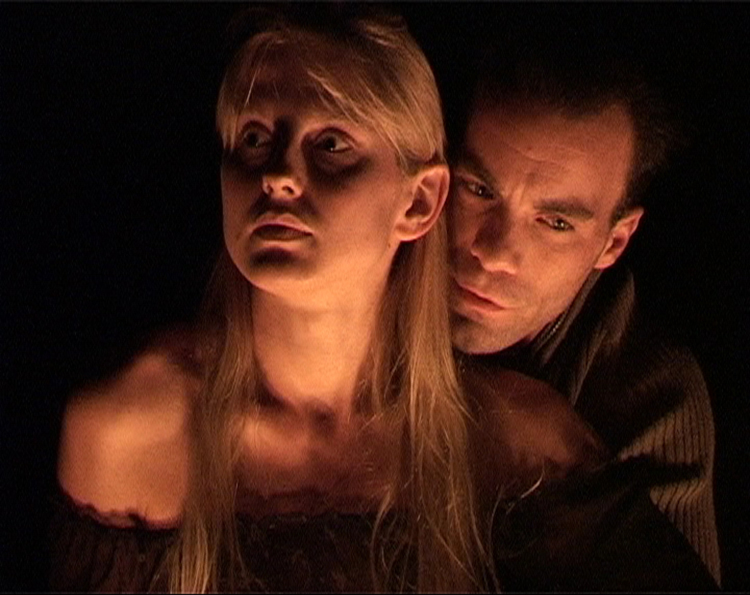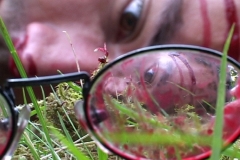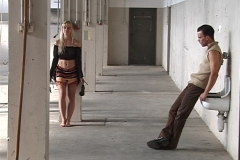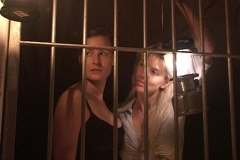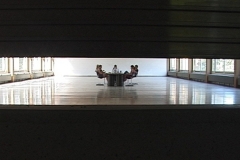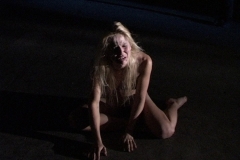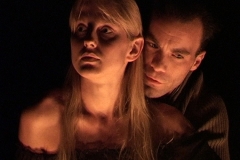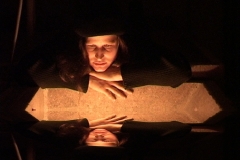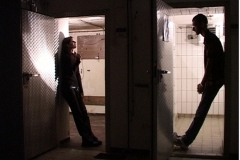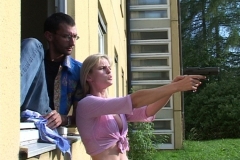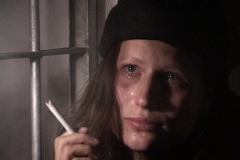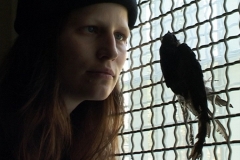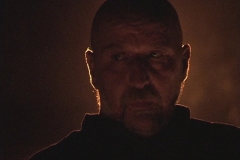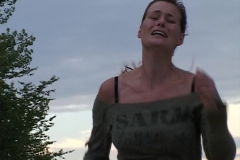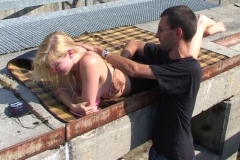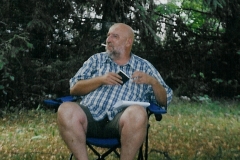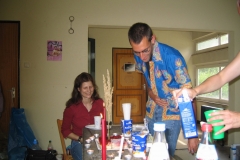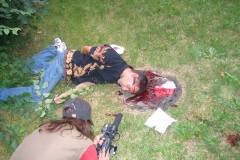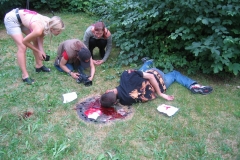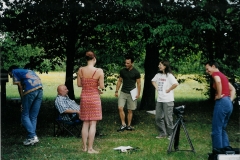
Mit dem Laden des Videos akzeptieren Sie die Datenschutzerklärung von YouTube.
Mehr erfahren

THE DARK SIDE OF OUR INNER SPACE
a film by Roland Reber
Germany 2003, thriller, 90 min, rated 16
- „Roland Reber: An Institution in direction. To say that Roland Reber is an exceptional director would be describing him half-heartedly. For the man is himself a lesson to the entire fraternity of world cinema.“ (Hindustan Times)
- “The Dark Side of Our Inner Space is a work of a true poet, indeed a stunning, brilliant cinematic achievement.“( Gordon Weaver, Film publicist, USA)
- “This film is something very precious of new German cinema.” (Dietmar Wladek, Journalist)
since 27th of april 2007 available on DVD (in German)
with Mira Gittner, Marina Anna Eich, Sabine Krappweis, Christoph Baumann, Manfred Gebauer
camera: Mira Gittner, Roland Reber
editing: Mira Gittner
light: Christoph Baumann, Mira Gittner
music: Wolfgang Edelmayer
producer: Patricia Koch
writer and director: Roland Reber
production, sales & distribution: wtp international GmbH
„I want to get to know the dark sides in us humans because these dark places are alive. They are life.”
What is reality? What is game? Where are the boundaries? When does one turn into the other?
Tanja (Mira Gittner), Jessie (Marina Anna Eich), Anna (Sabine Krappweis), Marcus (Christoph Baumann) and Kai (Manfred Gebauer) go into a sealed off abandoned barrack to play the “Big Game” – a game aside any social norms or boundaries.
“In the time outside you have been bent by social rules. Here in the Barracks of freedom there are no rules. If you need some, create them…”
Each protagonist has his own game, his own version , to get advantage over the other : Jessie tries through sexual seduction, Anna through exercising power, Marcus by enacting rules, Tanja by keeping out of everything. Kai is the weakest link in the group and becomes everyone’s victim. Searching the „Big Game“ they embroil more and more into the interpersonal games and are slowly being drawn into the perfidious alcoves of their “inner spaces”. What began as a harmless game, ends in a too real tragedy.
The Dark Side of our Inner Space is a metaphor for the “Big Game” we call life. A study of the dark sides of our souls.
“ I didn’t give them rules. They could have created ones themselves.
They could have spent a beautiful, adventurous, joyful time here.
But they’ve chosen fight, intrigues and finally death.”
The basic idea of the film was, to bring a group of young people of the fun society into a sealed off field. In this isolation, without disturbing influences from society, the “Big Game” should take place, without any rules, without distraction through external stimulus and without specification, what the “Big Game” could be. All on their own, the single characters should try in different ways, to find out : what is game? What is reality? Where are the boundaries? Who am I, if I am not committed to any external constraints and games of society ? Am I able to exist without structure and predefinition? What am I supposed to do with myself?
This film gives no answers, it asks questions. Most people do not have answers, they do not even have questions.
THE DARK SIDE OF OUR INNER SPACE is the third part of Roland Reber’s Trilogy about the quest of the human for himself and had its world premiere at the 9th Calcutta International Filmfestival in November 2003 in India, and was received ,there and on other festivals, enthusiastically by press, professionals and cinema audience.
Since 27th of april 2007 all three films are available on DVD in Germany (in a 3/1 Roland Reber Box or separately – in German language).
FROM THE IDEA TO THE FILM
“In march 2003 the director of the Calcutta Film Festival told me that he wanted to make a Roland Reber Films section at his Festival in November. This special section of one director always includes three films though. Until then only the room and Pentamagica existed. “OK”, I said “you will be able to show three films in November, I promise.” Then he wanted to know the title and the plot of the third film. “It is about the hidden sides in us, about the Dark sides of our soul” I improvised spontaneously. And as this took place in English, the English title came out The Dark Side of our Inner Space. Now that the promise was made , we only had to develop, shoot and edit a film. We had a half year because in October the 35mm copy had to be in Calcutta. We did it. The dark Side of our Inner Space had its world premiere in November 2003 at the Calcutta International Film Festival.” (Roland Reber)
SPECIAL WORKING METHOD
teamwork – literally
This film is the result of teamwork. At the beginning of the shooting there was only the mostly opened basic idea. The characters and the basic structure of the story was developed together with the actors during the ongoing shooting. The Director and author Roland Reber then wrote several scenes, which were realised straight away or within the next days. There was no improvisation. Like this the film was built piece by piece.
Through discussion and treatment with the subject, everyone approached the core of the later realised form. Everything, also camera and lighting and later editing and music, arose from the creative energy of the team. Each participant could bring in his own creativity and ideas. There was no rigid adherence to a primary concept, but a permanent re-definition and flexibility of the approach. The constant questioning of already developed ideas was as important as spontaneous innovations.
“For THE DARK SIDE OF OUR INNER SPACE the location was the idea – an abandoned military base. During six weeks the actors, who were the crew at the same time, and I met every day in this barrack and through many discussions about all kind of things, the film developed day by day. I do not believe in telling stories in a narrative style, because our life is not wrote like a story with a preconceived structure and order. “Life is without text” is said in THE ROOM. It rather is multidimensional with abrupt transitions and all my films contain in some way the search for life, identity and the self.” (Roland Reber)
CAST
TANJA Mira Gittner
JESSIE Marina Anna Eich
ANNA Sabine Krappweis
MARCUS Christoph Baumann
KAI Manfred Gebauer
ER Roland Reber
INTRO-STIMMEN Patricia Koch, Carsten Frank
CREW
director Roland Reber
script Roland Reber
producer Patricia Koch
camera Mira Gittner, Roland Reber, Christoph Baumann
light Christoph Baumann, Mira Gittner
editing Mira Gittner
music Wolfgang Edelmayer
production wtp international GmbH
year of production 2003
time of production August 2003
locations Lechrainkaserne, Landsberg am Lech
Calcutta Int. Filmfestival, India (world premiere, section: Roland Reber Films) 2003
Siliguri Int. Filmfestival, India (opening film) 2003
Dakha Int. Filmfestival, Bangladesh (section: about Roland Reber) 2004
Panorama of Int. Film, Thessaloniki / Greece 2004
Cairo Int. Filmfestival, Egypt 2004
Sitges Festival Internacional de Cinema, Spain 2005
Alexandria Internationales Filmfestival, Egypt 2005
International Filmfestival of India, Goa 2009
Chennai International Filmfestival, India 2009
- „At the recently concluded Kolkata Film Festival, Romain Maitra found an incredible in Roland Reber’s new film, The Dark Side of our Inner Space, screened at the recently-concluded Kolkata Film Festival, the strange acrid edge of her acting talent could not have eluded you. You might have felt in retrospect the dark cry in her visage as though she had crunched her teeth on the worm in the apple of our desire. We saw her exposing the raw fibres of our psychological constitutions, to glare at the hidden contents of the forms that we are, almost with the intensity of a Klaus Kinski face in Aguirre, the Wrath of God…. And among all her works, the one that dwell memorably for a long time is her soul-searching act in The Dark Side of our Inner Space as we see light falling on her piercing and timeless gaze while she utters, „Where does it start? “… (R. Maitra, Star File: Talent & The Self: Mira Gittner, The Statesman, India 2003, complete article)
- „The Dark Side of Our Inner Space is a work of a true poet…When I finished watching the film I had the same sense of excited satisfaction that I’ve had on rare occasions when I’ve been privileged to see and hear magnificent world-class performers on the opera stage or talented musicians playing in perfect harmony under the direction of a brilliant maestro on the symphony stage… „ Jessie is dressed with her nudity like with a gown of concrete. The less she wears the more she covers the poverty of her existence…. When we free our locked in thoughts- this carcinoma of stored up fantasies- from the jail of our soul, the pus might run off which drown our yearning in the poison of non lived life… Maybe we all are figures standing in front of a mirror, just seeing ourselves in our loneliness… as true as any lie…” … these are the words of a poet, a very gifted poet… The acting, as an ensemble work and as individual performances, is first rate from beginning to end. The direction is crisp and generally moves the story along at a pace that seldom lags and always held my interest. The often harsh lightning and the up close and very personal cinematography not only kept me in a state of excited tension but also invited me into the film as though I were the camera. the editing was beautifully done without resorting to gimmicks… This is indeed a stunning, brilliant cinematic achievement.“ (Gordon Weaver, Film publicist and Academy member, Hollywood)
- „I am very impressed by your film, as because of the directing and the acting performance, the viewer gets the impression to be part of the Game. Finally I believe you managed, to display to the viewer, in a nearly frightening realistic way, how inside a small group of people the fight for power of the most intimate wishes and feelings can be driven forward, regardless of any personal relationships. This film is something very precious in a not now discovered genre of new German cinema.” (Dietmar Wladek, Journalist)
- „All his films are quest for life, identity and self. Philosophy is translated into his films. He regretted the lack of zeal among German youth to venture into the meaning of life. Superficiality and affectation steer them more than truth. They are lost souls in the fun and entertainment jungle of today’s so called developed civilisations. German youth lead their life in the labyrinth of sheer entertainment without any anticipation and apprehension about life. At this point Reber’s films strike and illuminate the dark side of our inner soul. (Shamshad Ali, Daily Bulletin, Calcutta Film Festival, 2003, complete article)
- „a bizarre German film, that plays with reality and deceit and is presented in Sitges04 in the Section „Europa Imaginaria“…“ ( El Diario del Festival, SITGES Festival Internacional de Cinema 2004)
- “Roland Reber: An institution in direction.” (Hindustan Times, complete article)
- “Freedom to create.” (Times of India, complete article)
- “The surprise package of this year’s selection.” (Times of India, Kolkata Film Festival, 2003, complete article)
INTERVIEW WITH ROLAND REBER (director / writer / camera)
You were wildly acclaimed in the theatre world. You wrote many plays in the past, acted and directed. What lead you to change into film?
Yes, I wrote theatre plays, was director, actor and teacher for acting in Germany and other countries. Amongst others I founded the Theatre Institute in Hamburg in 1981 and the World Theatre Project in 1989. An essential part of my former activities was to develop intercultural aspects and innovative techniques for actors and directors. If I wanted to say something about a specific theme, I wrote a play and realised it. However I realized at a certain point, that the stage had limiting boundaries, that should be crossed. Like this, I came to filmmaking, because cinema gives me more creative freedom. For me filmmaking is like talking, it is closer to myself. But like I do not understand myself entirely, neither do I understand my films entirely. Even if the films I make have a discernible handwriting, my style and the handling of the filmmaking depends on the respective theme and this can differ from one film to the other. That’s why the “dogma-films” originated in Denmark , with their fixed rules can never be my kind of filmmaking.
You have a totally new way of making and producing films. What does your working method look like?
The films are produced in team work. At the beginning there is an idea, which then is developed through all participants. The ideas come from everywhere – from the actors, the assistants, the technical crew or the producers, which most of the time are the same few persons, fulfilling several functions at the same time. Mira Gittner for example not only performed the main part in all three movies but was also personally responsible for the editing, sofor the composition of the film and shared the camera with me. Marina Anna Eich is not only performing main parts in front of the camera and co-producing, but is also responsible for the press and public relation work as well as for the sales and distribution of the films, etc…
At the beginning of the shootings, there are a few pages of script, based on an idea, a concept. It could begin with a monologue, a dialogue or just a part of text, which is later enlarged, changed, and of which I then write the final version. However this thin script is developed together with the actors during the ongoing shooting. For example The Dark Side of the inner Space: in this case the location was the idea – an abandoned military base. During six weeks the actors, who were the crew at the same time, and I met every day in this barrack and through many discussions about all kind of things, the film developed day by day. I do not believe in telling stories in a narrative style, because our life is not wrote like a story with a preconceived structure and order. “Life is without text” is said in the room. It rather is multidimensional with abrupt transitions and all my films contain in some way the search for life, identity and the self.
You like to work again with the same actors i.e team and they seem to get involved in a very special way , which differs from the conventional acting.
The core of the crew consists more or less of the same people in front and behind the camera, similar to an ensemble theatre. My relationship to the actors is not the one of a tamer in a circus. I ask them to approach the role with their own definition. The actors try to link themselves to the roles of the film, by reflecting themselves and realizing the difference between role and person. For me acting starts to be moving as soon as it is personal and authentic and that works better, when the actors analyse their roles and are not mere henchmen of a tamer. Actors are individual artists for me and if I had an exact conception of the role at the beginning of the shooting I would not need actors, but marionettes who just fulfil my instructions. Everybody is taking part in the creative process.
Your films are a criticism of the German society. How is this accepted by your compatriots?
In general the German became decadent. They are far more interested in money and career than in questioning the values of life. My films are an insight into the contemporary German culture. I touch the raw nerves of society by asking questions, and therefore my films can also be uncomfortable. Even if I can not give answers in the films, I make people aware of the issue.
Which is in your opinion the best way to become an independent filmmaker without the habitual pressure of the market?
The best way is the individual one. Each filmmaker should go his own way. We realise the films with a low budget, so that we can produce them ourselves and like this we always have the authority of what we are doing. We also use our own equipment and do the editing by ourselves. In brief we are a totally independent unity. And this gives us the freedom to be creative. If we have an idea, all we need is a camera, light and sound. We shoot digitally and then blow up on 35mm later. This gives us the freedom to try out things. Meanwhile most filmmakers in Germany are more like bankers – without any philosophical or aesthetical motivation. They make trimmed films, which are mainly decided by the financiers, who are depending on the demand of the market constraints. If we continue to let ourselves be dominated by the agents of the financiers, there will only be ready-made films. The filmmakers should take over the responsibility for their films again. With our films I hope to encourage to see creative adventures as a way again. Encourage to develop films which are not designed in an office but emerge out of the creativity of filmmakers. Cinema should become a voice again. A voice for those who do not have one. A voice which asks the society questions. Answers are not as important. Answers should be the result of reflections which develop individually within the heads of the viewers. Each viewer should be willing to think and to find his own interpretation… or at least to look for it. It is about dealing with oneself. The films are only the initiation. I consider my cinema as an adventure of the own mind, that provokes thinking. Should we accept everything without questioning?
You won many awards with the room. Did that change anything for you?
It was great, because many people did not believe in us at the beginning.
How did this come?
Mira Gittner sent video copies to festivals all over the world. When I became aware of it I made fun of her and told her it was senseless and that nobody would answer. But all of a sudden invitations came and everybody called us the “surprising filmmakers”. We travelled from Hungary to Spain and had a lot of fun.
When did it turn serious?
When we needed someone to do the public relations. We already had an invitation to the film Festival in Mexico and needed someone who likes public appearances: Marina Anna Eich. She liked that. Mira Gittner is very creative, but shy to public. So we were at the Film Festival in Mexico and watched the Award ceremony relaxed, we never expected an award. And then they announced “The President’s award for the best feature film : the room”. We took some time to realize we were meant.
Do you have idols?
No. There are many I like, but no one who influenced my work in any kind. This is a problem with many directors, they try to imitate Hollywood or whoever and will never be more than a copy. I always prefer the original.
You refer to the three Films also as a trilogy. What is the common core?
All three films have the subject of the SEARCH in common, questions like: who are we or where do we come from? The first realised as a psycho-thriller, the second as a black comedy and the third as a drama.
Where lies the difference?
In the story which is respectively told. Each film stands on its own.
How did you get the idea to the room?
the room dues its realisation to a packing case. Many years ago, approximately in 1985, I wrote a short manuscript because of a bet, with the basic story of the locked room. A friend editor told me it was impossible to write a story including suspense and eroticism in a very short time. This incited me and I wrote the manuscript in one night. I won that bet. Many years later this manuscript reappeared while archiving my texts and the film was made.
Why did you chose an English title for The Dark Side of our Inner Space?
In march 2003 the director of the Calcutta Film Festival told me that he wanted to make a Roland Reber Films section at his Festival in November. This special section of one director always includes three films though. Until then only the room and Pentamagica existed. “OK”, I said “you will be able to show three films in November, I promise.” Then he wanted to know the title and the plot of the third film. “It is about the hidden sides in us, about the Dark sides of our soul” I improvised spontaneously. And as this took place in English, the English title came out The Dark Side of our Inner Space. Now that the promise was made , we only had to develop, shoot and edit a film. We had a half year because in October the 35mm copy had to be in Calcutta. We did it. The dark Side of our Inner Space had its world premiere in November 2003 at the Calcutta International Film Festival.
World Premiere at the Kolkata International Film Festival 2003

Mit dem Laden des Videos akzeptieren Sie die Datenschutzerklärung von YouTube.
Mehr erfahren

